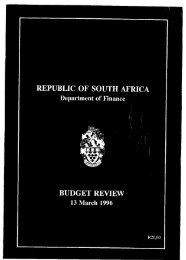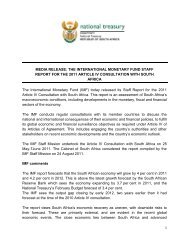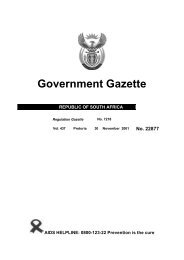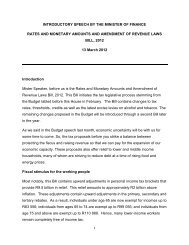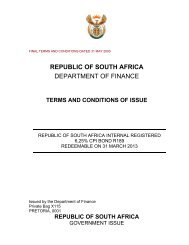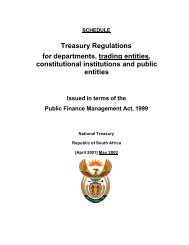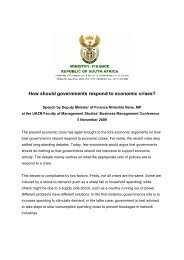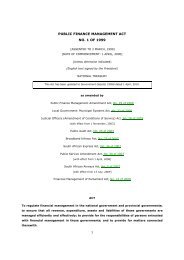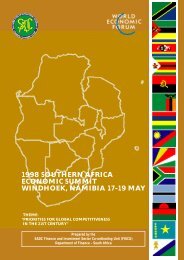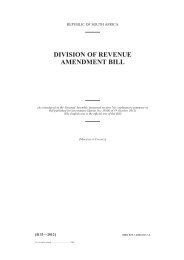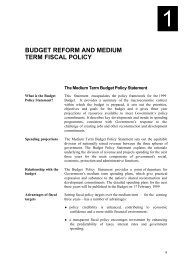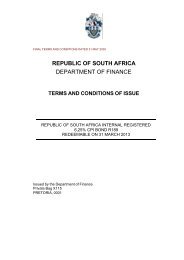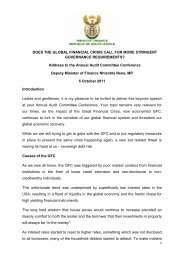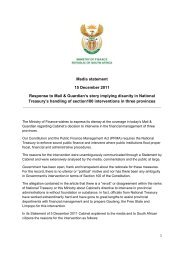Annual Performance Plan Jaarlikse ... - National Treasury
Annual Performance Plan Jaarlikse ... - National Treasury
Annual Performance Plan Jaarlikse ... - National Treasury
You also want an ePaper? Increase the reach of your titles
YUMPU automatically turns print PDFs into web optimized ePapers that Google loves.
c) The No-Fee Schools Policy was implemented during the course of this year. 424 schools were invited to apply for nofee<br />
schools status, and 419 of these schools applied, relieving the burden of school fees for approximately 150 000<br />
learners (15,1%) with effect from 1 May 2006. An allocation of R29 million was provided for in 2006/2007 and this will<br />
be increased to R139 million in 2007/2008 and further to R237 million in 2008/09. The allocation per head will increase<br />
from the current R527 per learner to R554 in 2007 and then to between R722 and R581 in 2008 dependent on which<br />
poverty quintile schools fall within. A further 233 schools (primary and secondary) were awarded no-fee school status<br />
w.e.f. 01 January 2007.<br />
d) A progressive increase in the number of teaching posts (an additional 500 for 2007), and the conversion of 458 ad-hoc<br />
teaching posts to permanent posts will contribute significantly to improving teacher-learner ratio, critical to the delivery of<br />
quality education. At the beginning of the 2007 calendar year, there will be 30 872 teaching posts. In addition, 50<br />
math/science teachers were appointed in the Dinaledi Schools (additional to the establishment), 21 additional teachers<br />
were appointed in the various Focus Schools to assist with the development of the Focus Schools concept, and 70<br />
posts were allocated to the 7 districts for a range of development interventions in disadvantaged schools, including the<br />
improvement of the performance of 34 under-performing high schools. The teaching assistant project appointed a<br />
further 510 teaching assistants in 163 schools. These teaching assistants were provided with training through the FET<br />
colleges.<br />
e) Dedicated support staff at the EMDC will continue to provide support to the literacy/numeracy strategy launched<br />
officially in 2006 after extensive consultation amongst WCED role-players at head office and EMDC level. As part of the<br />
literacy and numeracy rollout in the province, every Grade 1 to 6 class has a set of 100 books for reading, and all Grade<br />
3 and 6 learners have a mathematics textbook. Monitoring of classroom practise was initiated but due to challenges<br />
raised by teacher unions has been put on hold subject to a classroom visitation protocol being agreed upon. As part of<br />
this strategy, the language in education policy encouraging mother tongue education for the first three-years of<br />
schooling was developed and distributed to schools in 2006 and further debated at the Language-in-Education<br />
colloquium held in July 2006.<br />
f) Preparation for the further implementation of the new FET Curriculum has progressed relatively smoothly. Although<br />
mid-year Grade 10 results presented some cause for concern initially, extensive support programmes and systems<br />
have been implemented in schools to assist them in improving on these results. Provisional reports on end-of-year<br />
pass rate reveals a pass rate of 74%, with the South Cape/Karoo showing an improvement on previous years.<br />
Additional training of 9872 Grade 11 FET teachers took place in June, with longer training sessions for newer subjects<br />
including agriculture, dance studies, technology subjects (including CAT and IT).<br />
g) The WCED has been one of the front-runners in the use of ICT technologies in schools, and continues to do so. The<br />
Khanya project has assisted 575 schools in the effective use of ICT-technology, with a further 276 schools at various<br />
stages of preparation. 22 271 computers are being used in Khanya schools, with technology being used effectively by<br />
14 993 educators for curriculum delivery and providing access to 496207 learners. Khanya is consistently recognised<br />
as an innovator in school-based ICT-technologies. Growth in the areas of broadband connectivity for schools, and the<br />
continued roll-out of ICT infrastructure in schools will be addressed through CEMIS, Khanya and the<br />
Telecommunications Project (TK). The Khanya Project also won yet another Gold Award for excellence from the<br />
Impumelelo Innovations Award Trust. The Trust rewards exceptional projects, which involve partnerships with the public<br />
sector that enhance the quality of life of poor communities in innovative ways. The citation for the award reads:<br />
“A comprehensive and multi-faceted approach to the educational experience in classrooms across the Western Cape is<br />
the driving force behind the installation of computers in classrooms in schools in the last five years. Computers are not<br />
installed in isolation; teachers are given training, schools are provided with high-speed Internet access and schools are<br />
required to take a 'partnership' approach to the project by providing at the very least sweat equity to demonstrate their<br />
commitment. The support provided by surrounding communities has resulted in a decrease in the incidence of theft, as<br />
communities have taken ownership of the schools.”<br />
The Gold Impumelelo Award is the 11th award presented to the Khanya project over the past two years.<br />
h) The introduction of the NCS in Grades 10 to 12, starting with Grade 10 in 2006, has gone extremely well. A wide range<br />
of preparation activities included a highly successful conference for school principals and other school managers.<br />
Teachers responded well to training on the revised national curriculum for Grades R to 9. Continued rollout of the NCS<br />
in Grades 7 – 9 has been supported through 5-day orientation sessions for educators. In 2006, 2800 Grade 8 and 9<br />
educators attended such sessions. CTAs for Grade 9 were distributed to all schools. And the provision of textbooks to<br />
Grade 8 and 9 schools in the lower quintiles continues through the Inkxaso project.<br />
i) The continued improvement of access to Grade R and the quality of Grade R teaching and learning with the<br />
introduction of a new subsidy system for Grade R learners and the distribution of new teaching and learning kits that<br />
help learners to meet the requirements of the national curriculum. An integrated Early Childhood Development strategy<br />
has been approved by provincial legislature, and the <strong>National</strong> Integrated plan launched in October 2006. An additional<br />
6000 learners are being subsidised, bringing the total to 31300. Unfortunately, many sites are slow in applying for<br />
subsidies and in returning <strong>Annual</strong> Snap Survey results. For Grade R, the WCED doubled the subsidy from R3 to R7 per<br />
child per school day, and the WCED will be facilitating the training of 900 ECD practitioners identified by the Department<br />
of Social Development, as part of a broader EPWP programme.<br />
<strong>Annual</strong> <strong>Performance</strong> <strong>Plan</strong> 2007/08 – 2009/10<br />
13



